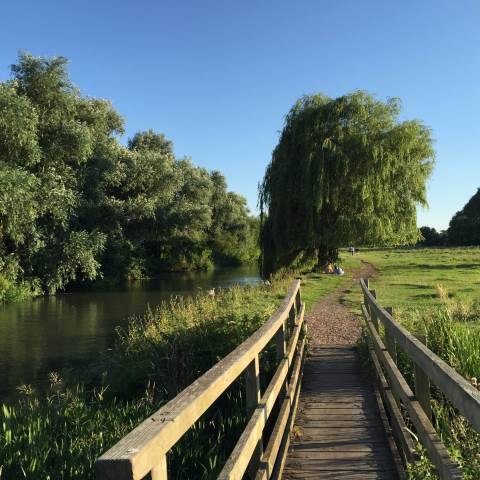

I’ve been obsessed with Victorian fantasy writer George MacDonald since I was 16 years old (yes, baby George is named after him). Although he is not widely known today, MacDonald was a household name in Victorian England, and was a prolific author of novels, fairy tales, and sermons. He was best at fantasy writing and has been called the “grandfather of modern fantasy” by some critics. C.S. Lewis and Tolkien were heavily influenced by him, and it is through C.S. Lewis’ frequent quoting of MacDonald that I discovered him as a 16-year-old.
Coincidentally, Lewis also discovered MacDonald as a 16-year-old, and his experience of MacDonald’s fantasy novel "Phantastes" mirrors my own. In his memoir "Surprised by Joy," Lewis writes, “it was as though the voice which had called to me from the world’s end were now speaking at my side.” Lewis goes on to state that "reading 'Phantastes' baptized his imagination," and credits this reading experience with setting the groundwork for his eventual conversion to Christianity.
I vividly remember sitting in the Fayetteville Barnes & Noble delving into this strange, dream-like fantasy novel that somehow awakened and gave form to my deepest desires. Like Lewis, I felt “as if I were carried sleeping across the frontier, or as if I had died in the old country and could never remember how I came alive in the new.” It was my first truly transformational reading experience. I really was a different person with a different understanding of reality after reading that book.
I went on to read nearly all of MacDonald’s work and even publish an academic article as a graduate student in the official George MacDonald Society literary journal 'North Wind.' When I heard about an entire conference devoted to MacDonald studies at the University of Cambridge, my heart leapt but then quickly sank because I knew I could not afford to attend. Fortunately, however, I work at a school with generous donors who value faculty development and enrichment. Because of the Thatcher Master Teacher grant, I was able to attend and even present at this conference.
Just being surrounded by other MacDonald enthusiasts was a joy in itself. For three days at the University of Cambridge, I nerded out hardcore. I had conversations with the top MacDonald scholars from the UK and North America. And surprisingly, at a conference mostly filled with tenured professors and Ph.D. students, my presentation proposal was accepted and I was asked to give a 20-minute presentation.
Part of me was terrified, being just a small-town middle school teacher presenting to professional scholars, but it was also so cool just to have them listen to my thoughts. During the 10-minute question period at the end of my talk, several distinguished scholars asked follow up questions that lead to some interesting discussions. The highlight of the conference (and possibly my life) was when Stephen Prickett, probably the world’s top MacDonald scholar, approached me during a break to tell me that he really enjoyed my presentation, which argued that "Phantastes" is both influenced by and a theological critique of E.T.A. Hoffman’s "Der Goldne Topf" (The Golden Pot).
I also found time to explore Cambridge and the surrounding English countryside. The relatively small town is distinguished by gothic architecture, ancient churches and beautiful green spaces. One evening I walked a few miles down the River Cam to the small village of Grantchester. The path runs along the river through idyllic meadows of grazing cattle, occasionally meandering under the shade of ancient trees. During the summer months, students can be found swimming and “punting” down the river. My idea of “punting” involved kicking a football, but apparently in Cambridge this means boating down the river using a large pole “to propel the boat by pushing against the riverbed.”
After the conference, I visited a few London-based friends, including Darlington legend Mike Nealis, who currently teaches at an American school in London. Mike and I caught up over lunch at an English pie shop. We both had a delicious venison and boar pie and shared a rhubarb pie with custard for dessert. I also met up with my friends Sean and Laura whom I initially met in 2012 during my time teaching in South Korea. They drove me out to Highclere Castle, better known as Downton Abbey, and let me accompany them on several other delightful excursions.
This experience is one that I will treasure for a lifetime. I am so thankful to work at a school that prioritizes faculty development. I could not have had this amazing experience without the generous financial support of the Thatcher Fund.